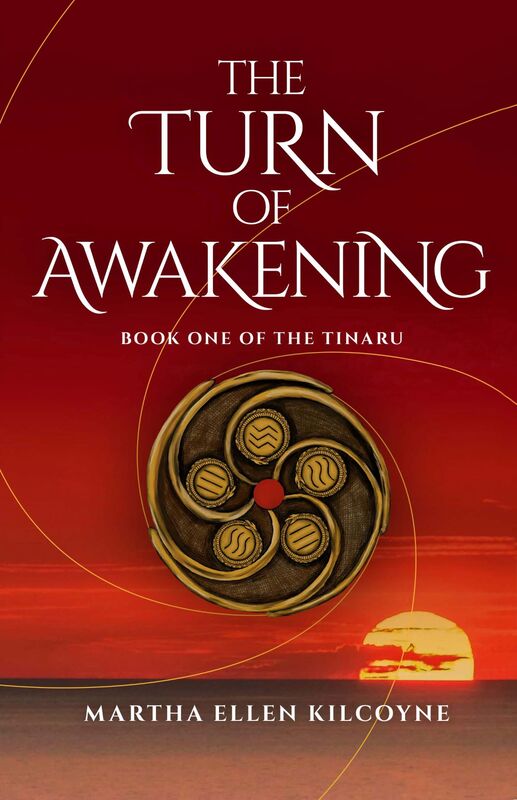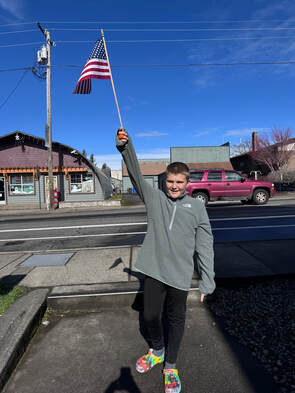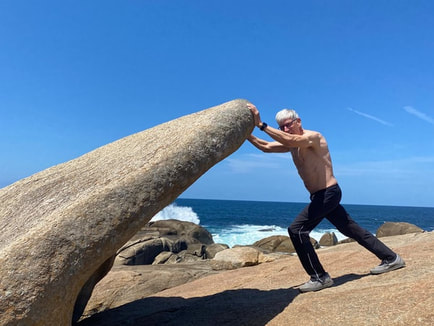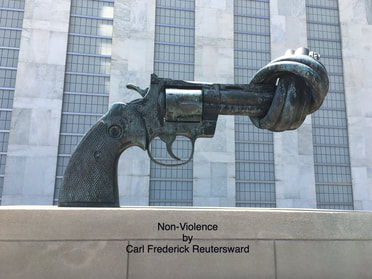|
"The Day After"
My initial response was relief when President Joe Biden withdrew from the presidential election. Then I wasn't sure. Then I was. Then I wasn't. Then, I was angry that he had to withdraw. He had a bad night. After all he had accomplished in the last three and a half years, it didn't make sense. Then I was angry at his staff, at his campaign, and at the Democratic National Committee, and then I was looking for people to be angry with. Why didn't we know he was struggling? I last saw the president at the State of the Union Speech in March. He seemed fine. He seemed great. He seemed presidential! Even when he went off-script, he did fine. What happened? I stayed in Joe's camp for two weeks. I convinced myself that the constant campaign talk was helpful. People were focused on the campaign. Then, the number of Democratic leaders' encouraging him to step aside grew. A poll suggested that 2/3 of voters wanted the president to withdraw. I'm not too fond of polls, so it was frustrating to see the Democratic leaders pushing and pushing for his withdrawal. Things were going well. The president's accomplishments—from the strongest economy to investments in rebuilding, lowering prescription drug prices for seniors to care for veterans, and appointing the first African American woman to the Supreme Court—were truly impressive. And he was growing older. He didn't miss one day! His opponent was also growing older. With all this momentum for our country, we asked/forced him to step down because he is old – which we already knew. He was planning a one-term presidency. Then, a fascist want-to-be-dictator decided to run for president. By running again, Joe Biden believed he was protecting our democracy. Now he's too old? OK, one bad night. Yes, it was bad. It would have been better if his makeup didn't make him look like a ghost. It would have been better if he was rested. It would have been better if he had decided not to debate a felon. Where was his team? Why did they accept the debate? Biden didn't need to debate to show the voters what he could do. He was the president with substantial accomplishments. My anxiety about what he's going to do is gone. It has transferred to what will happen next. The uncertainty of the upcoming Democratic Presidential nominee for President of the United States is stressful. It could be August 22nd before we know. I will continue writing weekly postcards to voters in swing states and proudly vote for the Democrat on the ticket, whoever it is! How are you feeling? Let me know. Thanks
4 Comments
Dear Readers, This article appeared in the Newburyport Daily News on May 20, 2024. Vote for a Leader, Vote for Biden
Fourth in a Series America has successfully solved national problems and advanced our democracy from the beginning. The challenges have included:
History tells us that our presidents have been leaders in these areas. Faced with the horror of slavery, President Lincoln signed the Emancipation Proclamation and shepherded the passage of the 13th Amendment to the US Constitution which abolished slavery in 1865. President Franklin Delano Roosevelt created financial relief mechanisms for Americans, including jobs and unemployment benefits, Social Security benefits for seniors during the Depression, and the GI Bill in 1944 for returning World War II veterans. Science and technology took off with President Eisenhower's creation of the National Aeronautics and Space Administration (NASA) in 1958, and his establishment of the Interstate Highway System in 1955, paving the way for the future. President Lyndon Johnson championed the Civil Rights Act of 1964 which continues to protect Americans' rights today. His legacy includes the War on Poverty, which reduced poverty in America by half. President Nixon established the Environmental Protection Agency (EPA) in 1970 to protect human and environmental health, followed by the Occupational Safety and Health Administration (OSHA) to protect the safety of our workers. In 2010, more than 40 million additional Americans received health insurance because of President Obama's Affordable Care Act. These are examples of strong leaders. They had the courage and skills to meet America's challenges. Regardless of party, presidents have successfully solved problems for centuries while maintaining our democracy. It is up to us, as voters, to select the next leader who will have the courage to support Ukraine in its efforts to resist Russia's military aggression, find balance at our southern border, and maintain our democracy. President Biden continues to show that our government can work for all Americans. During the last three years, his administration has passed legislation to invest trillions of dollars to support our country. Stabilize the economy. Rebuild roads and bridges. Expand health insurance. Lower drug prices. Combat climate change. Bring computer chip production back to the US. Protect women from violence. Expand safety laws for firearms, the #1 cause of death for children in America. Defend reproductive freedoms. In 2021, Newburyport received $5.4 million from Biden's American Rescue Plan Act. About half of this money went to improve streets and sidewalks. Biden has proven himself a leader of the free world. His ability to cooperate with a divided Congress has led to the passage of critical budgets, management of our debt, and financial support for countries at risk. While Biden has put his energy into improving the country, his opponents have used fear and lies to divide us, create chaos, and take away our freedoms. Many Americans feel uncertainty. Will Social Security remain viable? Will housing become more affordable? Will reproductive rights be available to women in the future? Democrats believe that individual people and government have the power to work together to achieve America's promise of democracy and prosperity. "Government of, by and for the people" is a future only you can ensure by voting. VOTE! Collaborators: Elizabeth Kilcoyne, Newburyport, Kathy Pasquina, Newburyport and Patricia Skibbee, West Newbury 5/20/2024 Leave us a comment and let us know how you're supporting our Democracy in the next election! Distracted There was a sign saying "No Dogs Allowed Inside" on the front door and a sign "Beware of Dog" on the bar. Just being careful, I guess. Last night we went to a MeetUp at the Lucky Labrador Café and Brewery. MeetUps are an opportunity for local people who share similar interests to gather. While we were living for a month in Portland, Oregon Denis and I found a writing group at Lucky’s. A darts game was in process next to the front door when we arrived. Patrons’ dog photos lined the hallway to the entrance of the main room, which was the size of a basketball court with wood-paneled walls and cathedral ceiling. The bar stretched the length of the room and highlighted the dog beers on tap: Super Dog IPA, Wag Hazy IPA, Blue Dog Amber. All the food options were written on the wall. We ate before arriving, but everyone else drank and ate dinner. I had the Black Dog Stout. Excellent! T-shirts for sale hung behind the bar: gray, blue, black, green/yellow, and yes, a black lab on the front with its tongue sticking out. I suspect another lab was on the back. Large paintings of Labradors were scattered throughout the room, and a huge painting of black-and-white cows hung over the bar. At the far end of the bar stood a wilted palm plant next to the children's high chairs. A patron who seemed to have had numerous beers informed me that the palm was there at Lucky's opening in 1994, so the plant was 30 years old. Didn’t look a day over 29! On the back wall hung a lonely surfboard over an old dusty piano and more plants that could use water. Bookshelves full of tattered games of the past, like Monopoly, Scrabble, Clue, Risk, Taboo and many others, filled the rest of the wall. A wall of picture windows, trimmed in red beaded lights, looked into an enclosed alley with no obvious purpose. Assorted construction materials cluttered the ground, and a rusted door led the way out. In the alley, an elongated mural replicating Andrew Wyeth's Christina's World was painted on the wall. The young woman in the painting, Anna Christina Olson, had a degenerative muscular disorder and could not walk. She refused to use a wheelchair and crawled everywhere. I found the mural out of place in the dirty alley. Christina was a disabled woman and deserves more respect. In the middle of the room were more than 60 heavy wooden tables and chairs that were impossible to move. Most were occupied by a MeetUp of thirty-somethings playing Magic: The Gathering, created in 1993; the world’s first trading card game. Players battle each other by casting spells and trading cards. Next to us was a Meetup of Women in Science. Twenty three women mentored recent college graduates about careers and opportunities in the science field. There were twelve of us in the writing MeetUp. I had intended to write a treatise about the political moments of our time, but instead I was completely distracted by my surroundings and wrote this descriptive essay of the Lucky Labrador Café and Brewery in Portland. Thanks for reading. The funny thing is I'm not a dog person. Leave me a comment. Biden Gets it Right! Third in a Series Since he took office in 2021, President Joe Biden has signed many bills that benefit individual Americans and their families. His American Rescue Plan provided direct economic relief to businesses, local governments, and families during the crushing pandemic, and increased the Child Tax Credit, which according to the census bureau lifted more than 2 million children out of poverty. Biden is now supporting legislation to expand the Child Tax Credit for the next three years. The House of Representatives has already passed this bill, and the Senate is favorable to it. His Bipartisan Infrastructure Bill has so far allocated $6 billion to Massachusetts to support more than 190 projects across the state. These projects will reduce the monthly cost of high-speed Internet for more than 360,000 qualifying households, fund the upgrade of Terminal E at Logan International Airport (finished), restore and modernize the Sagamore Bridge on the Cape Cod Canal, to name a few. President Biden's CHIPS and Science Act provides public investment and incentives for private investment in semiconductor manufacturing. Semiconductors were invented in the US, but 90% are now produced in Asia. This led to a major blockade in the supply chain needed to support America's technological needs. Microchips for future critical technologies (phones, computers, cars) will be manufactured in America. Biden described his initiatives as “growing the economy from the middle out and the bottom up, not the top down.” Recently reported Special Counsel Robert Hur published the report on Biden's handling of classified documents. It said the evidence did not support the prosecution of the president. The prize for irony this week goes to Biden’s opponent. Trump told an audience he would encourage Russia to “do whatever the hell they want” to NATO countries that do not devote 2% of their gross domestic product to building up their military. This from a man who routinely didn’t pay millions he owed to building contractors for the work they performed for the Trump Corporation, then boasted that if they sued for payment, he would automatically counter sue for double the amount to intimidate the contractors. And he/his companies declared bankruptcy six times. The US Senate passed the $95 billion foreign aid bill for Ukraine’s defense against Russia, security aid for Israel, humanitarian aid for Gaza and more. Twenty-two Republicans supported this Democratic bill, demonstrating that President Biden can bring parties together. We are at a crossroads. We can sit back and just hope the right path is taken or we can STAND UP AND JOIN IN to ensure that we take the best path for America. For the next generation. We support policies that care about people. Democrats and most Americans are talking about achieving the following goals: universal healthcare universal reproductive healthcare the Child Tax Credit excellent educational opportunities for ALL students affordable housing living-wage jobs affordable groceries solutions to extreme weather/climate change civil rights for ALL Americans improved immigration laws safety and harmony throughout the world government actions that help people. President Joe Biden and Vice President Kamala Harris are working to achieve these goals for a better life for all Americans! Stand up, join in and actively work to re-elect them in their efforts to reach these goals. Yair Rosenberg, a writer at The Atlantic, said it best: “The President’s strength is not orating, but legislating; not inspiring a crowd, but connecting with individuals.” *** After the last blog, readers reported they are post carding with Indivisible. Another reported being part of SwingLeft North Shore. Another reported participating in Danielle Allen’s Partners in Democracy (nonpartisan.) https://partnersindemocracy.us/ Please refer to the previous blog HELLO #44 for other organizations. Let us know how you are standing up, joining and actively working to re-elect President Biden. Collaborators – Elizabeth Kilcoyne, Kathy Pasquina, Patricia Skibbee We can’t have Democracy without Voter Participation. Second in a Series Democrats – Unenrolled – Republicans We are the voters, all of us. We are Americans who value self-determination. We are Americans who thrive on freedom. Black Americans and women fought for and won the right to vote. Americans supported the efforts in the world wars to protect democracy. The 2024 presidential election is November 5th, less than ten months away. Now we are called on to protect our democracy once again. In addition to our own vote, we can encourage others to vote. Now is the time. Here are several organizations that emphasize the importance of democracy over MAGA extremism and provide opportunities for getting involved: * Indivisible focuses on winning back the 18 Republican “UNREPRESENTATIVES” that won congressional seats in districts Biden also won in 2020. They encourage postcarding. It works! *The Lincoln Project creates ads that display the dangers of MAGA extremism and runs these ads in battleground states. This helped Biden win in 2020. Donations are needed! *The Democratic Party site focuses on Biden’s presidential campaign and the House and Senate campaigns. Click on “Take Action” and check it out. *Your local Democratic City or Town Committee. *Donate directly to campaigns and candidates you support. MAGA extremism is not some abstract, vague idea. It is real. The Republican front-runner, if elected to office, says he would “terminate” parts of the U.S. Constitution and use our government to take revenge on his political enemies. MAGA extremism is about stripping what’s left of our reproductive rights, banning more books, and warning the Supreme Court that if his name is taken off any Republican primary ballots, “chaos and bedlam” will follow. * * The next piece in this series will share Biden’s accomplishments during his first term. Please share the names and contact information of organizations where you volunteer under the comments below, and I will share them in future blogs. Collaborators: Elizabeth Kilcoyne, Patricia Skibbee and Kathy Pasquina The Paradox of Two Americas
First in a Series * It is the best of times, Businesses and consumers are spending more which bolsters the economy. Employment is strong. Wages are up. The dollar is strong. Stocks are up. it is the worst of times, Reproductive health care is in danger. 26 million Americans are without any health insurance. Daily mass murders are commonplace. Corporations increase prices to improve profits. it is the age of wisdom, Most Americans believe climate change is threatening our earth. it is the age of foolishness, American leaders are not working effectively to resolve the crisis. it is the epoch of belief, Most Americans believe our country will survive and thrive. it is the epoch of incredulity, A despot may become president of the United States of America. it is the season of Light, Democracy encourages voter participation. it is the season of Darkness, Democracy is threatened by despotism. it is the season of hope, Americans are people of self-determination. Americans thrive on freedom. Americans are strong. it is the winter of despair. Truth is in a race against deception. * YOU can influence the future. Start now. The next piece is this series will share some suggestions and ideas on influencing. Please leave your suggestions under comments, and I will share them in future blogs. Collaborators: Elizabeth Kilcoyne, Patricia Skibbee and Kathy Pasquina “MISadventure” Denis and I had reserved six weeks in the summer to travel to Europe. The details were thin until he suggested we walk from Santiago to Finisterre on the west coast of Spain, known as The End of the World. I was surprised and suspicious of this suggestion. I had walked the Camino de Santiago, a 500-mile pilgrimage through northern Spain in 2011. Returning to Santiago and the coast has always been my dream. Walking with Denis wasn't part of it. Denis runs, he works out, he doesn't walk for the beauty of nature. So I said, “No.” A pilgrimage is a journey that one takes for a reason: to be alone with spirituality, to recover from a difficult decision, to retreat from the demands of a busy life. The Camino is a "bank of challenges for your humility and your real lesson in spiritual and human possibilities." Denis needed encouragement to go on a one-mile walk, never mind a 10-mile daily journey. In the next few weeks, he began to propose walks and hikes. He never complained. We were officially in training and Denis was an equal partner on these walks. I was delighted. We were going to Santiago! The plan came together. Copenhagen for a photoshoot would be followed by a sail through the fjords in Norway, coffee and checking out the art scene in Berlin, and visiting Denis's daughter Louisa in Munich—or some variation of that. Apart from our one-way ticket to Madrid, these were ideas. No reservations were made in advance. Adventures were in our future. We are not novices; we had both traveled in Europe after college in the 1970s. My adventures included four girls carrying bright orange and yellow backpacks, wide-eyed dreams and Europe on $5 a day. We got to London and had two months to see everything. There were no reservations except a return trip from Paris to Boston at the end of the summer. Seven countries later I was ready to return to America! I was twenty-one. When we arrived at Logan Airport, I walked down the stairs to the tarmac and kissed the ground. A journey I will never forget. Denis traveled from the Army on a 30-day leave and navigated the Greek Islands on ferries and a motor scooter. Ferries carried him to Crete, Rhodes, Mykonos, and Kos. On the last island he rented a scooter to find a castle in the mountains. Antimacheia Castle stood on a high hill as a beacon of strength. Details were available in Let’s Go Europe. No reservations needed! Fifty years later we were excited as we approached the Iberian Airlines counter. We had two hiking packs, two overhead suitcases and two business-class seats! A bit of a splurge for us. Passports reviewed, bags checked and we would be on our way. The agent then asked us for our return tickets. We said we didn’t have any. To our shock, she said she couldn’t check us through to Madrid without return tickets. She also said she could not sell us the tickets and we had only 45 minutes to produce them! We just stood there and did not connect with what had just happened. Reluctantly leaving the counter, we sat in a quiet area and fumbled for a few minutes with our phones. Nothing. Finally, after a phone call, our Mac nerd friend found us an expensive return flight with ten minutes to spare. When we stood at the lighthouse at the End of the World, the Spanish sunset on our face, the Atlantic before us and the gratitude of our time together, the stress of our flight arrangements felt far away. Denis encouraged me to stay on the rocky coast until I experienced everything I had dreamed of. The "End of the World" is the home of an ancient pilgrim ritual to burn an item of clothing worn on the Camino. This further symbolizes leaving your burdens behind and pursuing a new chapter of life. For twelve years, the pink tank top I had worn for 37 days on the Camino had rested in my drawer. It even made it through the move to Newburyport after Denis and I married. Now I burned it in a protected cove near the lighthouse. My last thought was gratitude for my life, my children and Denis. This part of the journey went as perfectly as any walking journey could. Denis and I met in 2012, a year after I first completed the Camino. It was one of those moments. We were both looking for someone to love and love us back. Six months later, he invited me to travel with him to Italy. A foreign language, a foreign currency, limited phone usage. I asked: "What's my second option?" We ended up traveling through wine country in northern California. We work hard every day to respect each other and deal with disagreements with composure, knowing that we love each other and are in this relationship together. Copenhagen was a late addition to our journey. Denis had an appointment for an experimental art shoot on the rocky shores of Denmark. A few years before, while flipping through an L.L.Bean catalog, I had suggested that Denis would make a great model. He is tall and handsome, and his physique reflects his training in the gym since he was 12 years old. I thought he would look great in outdoor clothing. Denis heard "fitness model" in which you disrobe to your Speedo to show your muscles. After his first photoshoot, I was quietly shocked. The images were artistic and well done. I just wished it was someone else’s husband in the photo! My Irish Catholic upbringing showed through. Denis was not embarrassed at all. He spent much of his adult life in Germany, where comfort in the human body is natural. Now I’m used to it. Denis follows the work of a Danish photographer and they had planned an art shoot together while we were traveling. It was on the way to Oslo. We stayed at the Hotel of St. Thomas in Copenhagen in a room so tiny that when you opened the bathroom door it hit the bed. We dined at the café across the street, and when we returned, Denis started to get chills. I switched off the air conditioner and covered him with one duvet then another. We are healthy people and I wasn't used to seeing Denis shake like that. We tried to talk about what was happening, but he could not have a conversation. I went to reception to find more bedding. During the night he started sweating and soaked everything. Denis felt better in the morning and assured me it was just a cold. He got a haircut and we visited the Louisiana Museum of Modern Art. We love contemporary art, but this art had limited interest for us. Fortunately, it was a perfect summer day. The museum grounds were beautifully landscaped and inviting, with live music on the lawn. Denis got tired, so he sat on a rock with a fabulous view of the ocean while I bought sandwiches. He was ready to leave, so we walked to the nearby station to return to the hotel. I had started having diarrhea that morning, but had not told him yet. At the railroad station, he knocked on the toilet door and said, “The train is coming.” There’s no way I was going to shout back: “I have diarrhea!” So I shouted: "Thank you for the information, but I can't do anything about it." We missed that train. Back in the hotel, both ill now, Denis's chills and sweats worsened and I spent the night in the bathroom. On the day of the photoshoot, Denis had to be seen by a doctor. Denis is a physician’s assistant and with sore throat and weakness, he thought it was pharyngitis and would need an antibiotic. We didn't know if what we had was contagious, so we wore masks. In the emergency room, the doctor immediately told us to "take off those damn masks. We're not worried about airborne diseases here. I don't wear a mask and I see patients all day!" He said Denis had a virus that had already peaked; otherwise he was in great shape. He took a throat culture. It was negative and he tried to move us along. I thought I had a stomach bug and was not officially treated by the doctor. Denis asked if it could be COVID. The doctor dismissed the possibility and waved us away. He made us feel we were wasting his time. We had escaped COVID for 3 ½ years so it wasn’t on our minds. Denis went from feeling good to feeling uncomfortable so quickly that he didn't make the connection until we were in the doctor's office. After being reassured that Denis was getting better, we felt psychologically better about continuing our journey to Norway. We had places to go. We would be able to see ourselves in the fjords on the boat when the symptoms passed. I’m an extreme optimist, and that’s rubbed off on Denis. Regardless of the situation, he now says: "Let's move forward" and I'm right there with him. On the way back from the hospital, our taxi driver suggested taking the Pearl Seaways ferry to Oslo. All I could imagine were New England-style ferries: cold outside, cold inside, minimal meals. But he swore it was comfortable, so we made a reservation for the next day. Denis missed his photoshoot. At the hotel he continued to sleep and sweat. I wrote in my journal: “My body feels queasy, mainly dealing with diarrhea, and a sore throat is beginning. My appetite is gone. The last two days were full of trips to the supermarket, pharmacy and doctor. I desperately need fresh air.” The ferry turned out to be a cruise ship. Carpets on the floor, elevators, sparkling lights and above all warm! We wanted to use our time on the ferry to plan our trip to the fjords, but instead we could only focus on trying to "straighten up and fly right." This felt like a rollercoaster. One minute we looked forward, and the next we looked after each other's symptoms. The attempt to hide our illness fooled no one, as Denis slouched and I lay on a bench in one of the many cafes on board. He had a latte and I had herbal tea. We looked at each other but no words came. Dinner was a lavish buffet. Denis ate a good meal that night and I pushed chicken around my plate until it was worn out. After slowly making our way to the cabin, we opened the door and could not believe our eyes. Bunk beds! Denis was too weary to climb and I couldn't manage the up-and-down cycle for my bathroom runs. The bunk looked as if it were 10 feet tall. I left Denis in the cabin and found the customer service desk and explained that we needed a different room. The representative said all the double rooms were full. I explained that we didn't feel well and would take anything we didn't have to climb into. She had a small room that they do not normally reserve, but it had a double bed. She was right; it was a very small but cozy room with a private bathroom. It was the first time we snuggled in a few days. I slept next to the toilette, and Denis was next to me. Morning brought a calm sea and another good appetite for Denis. Unbuttered toast was my go-to. We sat in the dining room overlooking the ship's bow. For the moment we felt great! Oslo was so close we could taste it. It was an unusually narrow channel for the capital of Norway, with homes on both sides. Neither of us had ever been to Norway and were looking forward to it. The breathtaking cruise into the Oslo harbor inspired us. Denis put his hand on mine and smiled. “We’re going to be fine.” When we arrived at our Airbnb, we fell into bed. I was under the covers in the bedroom, Denis was on the sofa in the living room. On the way we had managed to buy a few groceries, a pizza and throat lozenges. I don't remember thinking anything but how bad I felt. My sore throat and headaches kept me down. After 10 minutes or a few hours Denis stood at the door and said, "I can't swallow; I have to go to a hospital." I heard, "I have a sore throat." I asked if we could go the next day. He said, "We have to go now." That was frightening because Denis doesn't complain. I immediately got up and dressed to go. We held on tight to each other in the taxi. The emergency room was full of college students who had attended a party the weekend before and were being tested for meningitis. After moving us from triage room to triage room, staff checked Denis' glucose levels. My turn produced little in terms of a diagnosis. I asked the nurse to test me for COVID-19. She looked surprised but did the test. In less than a minute she handed me a mask and said, "You have COVID!" Predictably Denis also tested positive. We were speechless. How did we miss this? Our admiration for Europe's healthcare systems fell a few feet. We had COVID-19 all along and probably left a long path of illness. We were horrified! In particular, I felt bad for the service desk representative on the ship, who had made our night so comfortable. Back in the Airbnb we were relieved. Denis asked me what I wanted to do. I said, "I'm going home!" I was done living in hotel rooms and trying to pretend I was fine. I wanted to be in my own bed at home. Denis couldn't sleep that night and found us a flight home for the next day. Denis and I strive to be kind to each other every day. On this journey, I realized what a great practice that is when you need each other to be strong and in control. We straightened up, put on our masks and talked to no one for the next 21 hours. Business class helped us to separate ourselves from the other passengers. It was after midnight when the Uber driver dropped us home in Newburyport, MA. Grateful. Thanks for coming on this misadventure with us. Leave me a comment so I know you're out there. "The sculpture Non-Violence has not only endowed the United Nations with a cherished work of art; it has enriched the consciousness of humanity with a powerful symbol that encapsulates, in a few simple curves, the greatest prayer of man; that which asks not for victory, but for peace." Kofi Annan The Irony of Last Night!
In August, I agreed to be moderator of a gun safety forum in Beverly, MA, at the CABOT cinema. I had studied gun safety and reached out to experts for advice to ask the panelists intelligent questions. We are fortunate to live in a state that cares about people and respects firearms ownership. On October 18, the MA House of Representatives passed House Bill 4139, an Act Modernizing Firearm Laws. This is a big win for Massachusetts! The bill now goes to the Senate for consideration. At 7 p.m. last night, the panelists educated me and the audience with their passion and expertise! State Rep. Marjorie Decker of Cambridge reviewed House bill 4139, highlighting: registration of ghost guns, enhancement of the Extreme Risk Protective Order (also known as the Red Flag law), expanded locations where firearms are not allowed, and data collection on gun-related crimes. John Rosenthal, co-founder of Stop Gun Violence and gun owner, spoke of the importance of registering firearms and conducting live firearm training for potential gun owners. He compared firearms to automobiles, both of which were lethal weapons and had to be taken seriously. Leading prevention activists Rebecca O'Brien of Moms Demand Action and Emily Rubio of March for Our Lives created a force in the room by saying "no thank you" to thoughts and prayers! They wanted bold action. Both are involved in electing local, state, and national candidates who care more about people than the support of the National Rifle Association (NRA). Also at 7 p.m. last night, just a hundred miles away, a gunman in Lewiston, ME, shot eighteen people and injured thirteen. Police from New Hampshire and Massachusetts are helping search for the alleged shooter Robert R. Card. There are surveillance photos of him holding an assault rifle-style weapon. The city of Lewiston and surrounding towns are on shelter in place orders, and schools and businesses are closed. Maine residents may legally carry loaded firearms in public without a permit or background check. In 2021, the Centers for Disease Control and Prevention reported that 3.4 out of 100,000 people die each year from gun violence in Massachusetts, the lowest death rate in the country. This represents 247 people we know and love, and that's too high. Gun violence is a serious public health problem. Massachusetts residents must pass a background check when buying a firearm from a licensed dealer, and need a permit to carry it. Our goal last night was to better understand this bill and what we as citizens can do to improve people’s lives. In addition to the people we lose to gun violence, it is the people who are left behind without a daughter or son or mother or father, and those who are survivors of gun violence who suffer. “Knowing I Would Return” People walk the Camino de Santiago for many reasons. Some seek peaceful meditation. Some are on a spiritual path. Some seek healing. Others are looking for healthy exercise and interesting people. I was searching for myself. The Camino provides for all intentions. In 2011, I walked the Camino (The Way of St. James), a 500-mile pilgrimage from the French border to the city of Santiago in western Spain. It was physically demanding and transformational. On my walk, I had burdens that needed to be resolved and left behind. A Camino ritual is to pick up a stone for a burden and put it in your pocket. You can carry this burden all the way or place it on a path marker so that another pilgrim can carry it for you. Conversely, you can take a stone from the marker and carry someone else's burden for them. The cross at mile marker 340 on the highest point of the Camino is called Cruz de Ferro. It accepts pilgrims’ burdens. On this hill, I left behind the stones that symbolized my 30-year marriage and the unresolved problems that complicated my life. Over time, intentionality and value have defined my days. On this path, there are many rituals and legends, such as the story of Apostle St. James, who was buried in Santiago in the Cathedral of St. James after preaching Christianity to believers and pagans both. Many pilgrims have traveled from all over Europe to Santiago to honor his presence and receive his healing power. The Cathedral of Saint James, built in 1075, with a striking mix of Romanesque, Gothic and Baroque architecture lies within the walls of the city. When you enter the city, time slows down and allows you to feel its symbolism and history. Since 2011, I have dreamed of returning to Santiago, located in the region of Galicia, where the weather is cool with blue skies and white puffy clouds except when it rains – a light lovely rain. I remember passing into Galicia and relishing the green forests and hilly terrain, as opposed to the mountains behind me. I imagined when donkeys pulled carts along these paths. My husband Denis of five years and I arrived in Santiago in July 2023, attended Mass at the Cathedral and found the Pilgrim House. It is a welcoming place where you can meet other walkers and learn about their travels. I thought it would be a good introduction to the Camino for Denis. At dinner, we met a young man named Peter, who had started his journey in England and had already walked 2,000 kilometers (1,243 miles). He was searching for inspiration on his ministry. A Danish doctor sat next to me and had just arrived from Porto, Portugal. She sought relaxation from a hectic hospital. Our plan was to walk further west from Santiago to Finisterre and then to Muxía, to experience the end of the world that kisses the Atlantic. We borrowed walking poles from the Pilgrim House and were on our way. With the Cathedral behind us, the business of life was left to others, and we focused on our feet, our packs and the beauty of the Way. Everything we would need for the next eleven days was on our back. The path was quiet. Markers with blue and yellow symbols that represent a scallop shell showed the way. Scallop shells are native to Galicia’s coast. Early pilgrims walked to the coast to collect a shell as proof that they had completed the Camino. They also used scallop shells to drink water and wine and eat small amounts of food donated by the churches. Today pilgrims hang scallop shells from their packs to identify with the Camino. When you see a pilgrim, the greeting is “Buen Camino!!” After my journey, I was on an escalator in Madrid with my pack, and an older man shouted “Buen Camino” a few times before I realized he was shouting to me. He and I smiled and waved. It’s a special community. As we walked through Galicia, rectangular boxes on pillars stood in front of many houses. Hórreos (pronounced OR-ray-os), as we learned, were built of stone in the 15th century to store and protect feed for animals, mostly corn. The pillars prevented rodents from destroying the annual harvest. Today, the hórreos are no longer needed, but remain crumbling with vines growing through them in front yards. We wanted to stop at the 6-mile marker on the first day, but the albergue (hostel) was closed, so we walked another 7.2 miles to Negreira. We ignored one of the few rules of the Camino: to start slow. In the evening, Denis's calf was swollen, and I had a heat rash above my ankles and aching shoulders. Our re-assessment included booking the van service to transfer our packs for $5 Euros to our next accommodation, but we would continue to walk the 12 miles. Such optimism for 70-somethings. The next day, we climbed a 1400-foot mountain. Wind turbines crowded the mountain ridges and lush corn fields grew everywhere. We felt sore, but nothing to complain about. The hotel was off the trail, so it came with transport. I asked the driver if the corn was sold in Santiago, because the population in this region was small. He laughed. “The tall corn is for the cows,” he said, “and the short corn for the chickens!” That's living off the land. When I got out of the van, my legs didn't work. Our legs were swollen and needed a break. Turns out we walked 21 miles that day. Not sure how that happened. During a delicious dinner, we planned to go by bus to Finisterre, rest for a few days, and then circle back to resume our journey. In Finisterre, Denis’s legs continued to swell. At the hospital, they took five vials of blood, put him on a saline drip, and x-rayed his legs. His calf and ankle muscles were inflamed and the doctor said to take it easy. He suggested seven days of rest. While in Finisterre, we ventured out of the hotel for a short walk to a small fishing museum. The docent was a retired fisherman with the energy and enthusiasm of a teenager! He called himself Nerium. His true name is Francisco Manuel Lopez Martinez. Alexandre Nerium is his pseudonym as a poet; he’s on Wikipedia. Nerium rounded up the visitors into a circle - two Spaniards, two Indonesians, one Brazilian and two Americans (us). He explained how the nets were created to capture specific fish. Sardines try to swim through the net to get the bait and catch their gills in the nanoholes. Small octopuses swim into a trap, eat the food, and stay there because they feel comfortable. He continued. During the beginning of ocean navigation, a heavy stone bell was dropped into the water with a long rope until it reached the bottom. The fathoms were counted on the rope to determine the depth of the ocean. To detect which fish frequented an area, animal fat was stuck to the bottom of the bell. When it was retrieved, sand, grasses, plankton, and mud identified the fish below. The creation of nautical maps relied on these discoveries. The fisherman shared his presentation in Spanish, body language, props and a bit of Brazilian, and we all understood. We happened upon him because we couldn’t travel far on our swollen legs. What a moment this was. Pilgrims have a partnership with the Camino. You do your best, and it accepts you as you are. If you can’t physically accomplish something, you find a way. After another day of rest, we circled back to the coastal route and avoided a mountain. The Camino is about moving forward. Denis's face lit up when he saw an outdoor gym with all his favorite equipment. He tried each one and felt at home. Further on, fields of corn and apple orchards led to forests and an unexpected breathtaking beach. For the next mile on our return to Finisterre, the water soothed our feet and legs! Along the way, you never know who to expect. While waiting for the outdoor shower at the beach we met a couple of well-toned 20-something guys from Germany and South Korea. The German shared that he was walking the Camino while on paternity leave. He explained the baby was at home with his girlfriend. We moved on because both of us were too shocked. Neither of us had a proper response to leaving your child and its mother to go on vacation. Even still, a beautiful day on the Camino ended with an Italian dinner and a glass of wine. Finisterre, or Fisterra, as it is known in Galician, is translated from Latin as “End of the World." The lighthouse at the “End of the World” stood two miles up a hill on Cabo (Cape) Finisterre. It was a beautiful walk, with the bay to our left and Monte Facho on the right. I sat on the rocks on the edge of the Atlantic and looked toward America, thinking about how grateful I am to be completing this journey and how it has changed my life. The "End of the World" is home to an ancient pilgrim ritual to burn an item of clothing worn on the Camino. This further symbolizes leaving your burdens behind and pursuing a new chapter of life. Unable to locate the fire-pit described in the guidebook, I found a protected cove to burn my shirt. I arrived unprepared, no matches. We looked around to see if anyone had a smoker’s face. The Spanish word for matches is partídos. The man we spoke to looked confused when I asked him. A bystander informed me that I used the word for a soccer match. We all had a laugh, but nobody had a light. Next, I approached an English-speaking waitress in the café and asked if she had a match. She loaned me her lighter. Denis kept watch, because I wasn’t sure if this was a legal place to have a fire. Seeing my pink tank top burn to ashes brought me final closure. I had kept that top for 12 years, knowing I would return to the Camino for this moment. When I started the Camino in 2011, I was looking for something - my future, myself, whatever I could find. Today I am a writer, have a partner I love, and continue to deepen my relationships with my family and friends. And I'm getting better at eliminating the noise in my life — going places just to have something to do. It makes more time for reading, exploring new ideas and engaging in political activity. Leaving Finisterre felt good, although Muxía beckoned from the North and became an extended destination. It’s a fishing village about 17 miles from Finisterre and takes two walking days to reach it. There are many ancient legends about the meeting of the Virgin Mary and St. James in Muxía. We will see the sun sink below the Western horizon and muse about the vastness of the Atlantic from a new perspective. Our backpacks were transported to Lires, the halfway point. This part of the walk is mainly a cart track through the forest, with views of the Atlantic to the west and more corn fields to the east. The eucalyptus trees were ubiquitous, but there was no beautiful scent, as I had experienced on the Camino before. They must need more moisture than the dense forest holds. We ate our sandwiches in a light rain after we found sitting rocks and talked about how our adventures affected us. Denis said, “My experience is different from yours. You are here after walking hundreds of miles on the Francés Camino. It's a personal and emotional experience for you. But I enjoy the peaceful walk through the countryside, following the way markers, and spending time together without distractions from the outside world. It was also intriguing to see how people live in these rural villages.” I asked about a favorite time. Big smile. “Working out on the gym equipment in the park was awesome, and going to the Asian variety store called the China Store, where you can buy a bag of bolts and panties on the same visit.” This was so heartening to hear. I knew Denis was enjoying himself, but it was different from our usual journeys to the cities. I initially hesitated to share this walk with him, because it is so personal. Another grateful blessing. We stayed at our first albergue in Lires. Denis agreed to stay in one; without this experience, it would not be the Camino. It was cozy, only four bunks to a room. The largest room I had slept in had more than 50 bunk beds. The albergue was connected to a hotel and a restaurant, which is unusual. We hesitated to dine there as a hindquarter of beef hanging in a glass freezer stood in front of the dining room. We rarely ate red meat. But we found a few fish dishes on the menu and a table in the corner. The fish stew with noodles was delicious, and the Spanish flan, baked custard topped with caramel and whipped cream, brought back more memories. So wonderful. One last mountain range stood between us and Muxía. In deference to our legs, we took a taxi to downtown Muxía near our hotel. When we made the hotel reservation, the host asked if we wanted twin beds or the matrimonial bed. A perfect way to distinguish between a European double (twin beds pushed together) and a single bed. Muxía (pronounced Moo-SHE-a) is solidly located on the side of a hill overlooking the authentic Galician fishing village. It survives on tourism and on rich fishing grounds offshore. It’s known for beautiful sunsets and more legends. Muxía is connected to the Camino because St. James was sent to Santiago to convert the pagans to Christianity. Believing he had failed, he came to Muxía to rest and heal. As the legend goes, the Virgin Mary arrived in a sailboat, assuring him that he had been successful with the pagans and should return to Jerusalem. The boat turned to stone, and the sail remains on the Atlantic shore as a mammoth stone with miraculous healing powers. Denis took off his shirt and tried to move the sail. Another fitness model photo! Muxía had a festival that weekend, and we danced to Spanish music in the streets. The instrumental music was recorded as young women sang from their hearts on stage. This is a tradition we need more of in the US. Back in Santiago, I had to finish a project that inspired me in Finisterre - a tattoo of the Camino shell above my left ankle. I never thought I would get a tattoo in my lifetime, but inspiration overwhelmed me. I love it. Now I carry with me every day the joy and knowledge I have learned on the Camino. “Buen Camino,” Elizabeth Kilcoyne 9/22/2023 Thanks for reading! Leave me a like or a comment so I know you're out there.  DEAR READERS, Ever wondered what the solstice represents beyond the longest and shortest days of the year? Or about the energy in earth, water, air, fire, and spirit? Bridget didn't wonder about this until her husband died. She was lost; she went through the motions of life with the help of Jameson Whiskey. Not too much, just enough to numb her feelings. Her children were in high school experiencing the future and Bridget was struggling. On an afternoon trip to her childhood mountain, she encountered women who would influence her life. Technically, they were in her bloodline, and each had a unique magical skill to help Bridget open up to her past and future. These magical concepts were new to me, but after reading Martha's book I feel more enlightened about possibilities. Perhaps an opportunity to look beyond what is in front of me. The Turn of Awakening is a page turner and educator. I look forward to Bridget/Brigid in the next book in the series The Turn of Seeking. Martha Ellen Kilcoyne is my sister and I give the highest recommendation to this book - A great summer read. You can read more at www.MarthaEllenKilcoyne.com or purchase at https://www.amazon.com/dp/B0BXBJY2MT Leave me a comment so I know you're out there! Onward, Elizabeth |









